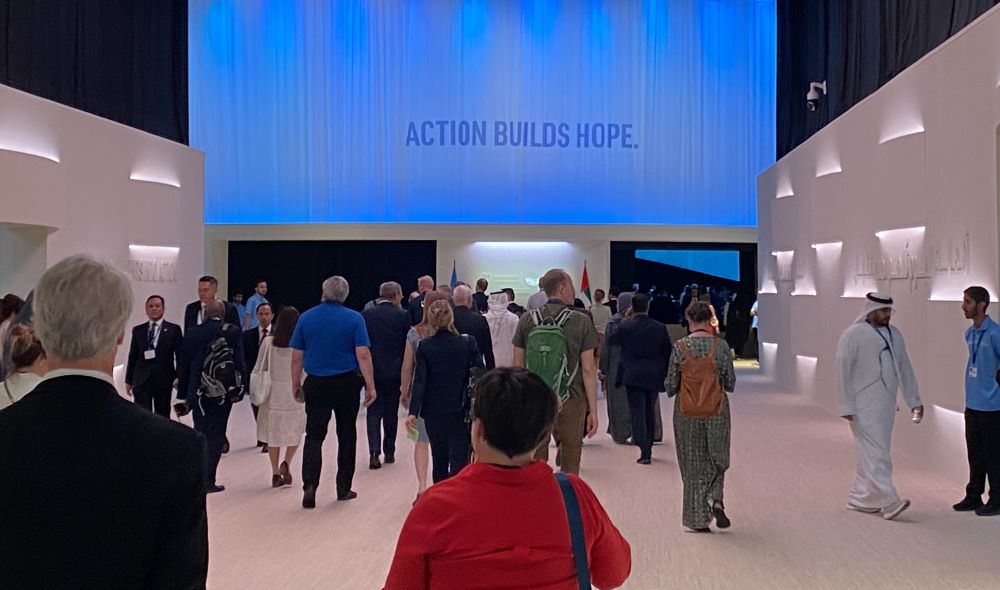I have written a couple of posts now on New Westminster’s presence at COP28, and the experience of the Local Climate Action Summit. I’m going to try to wrap up this series pulling highlights and major themes that came out of the event instead of daily run-down, because this blog series is already 5,000+ words and because there were a LOT of topics covered and incredible speakers: 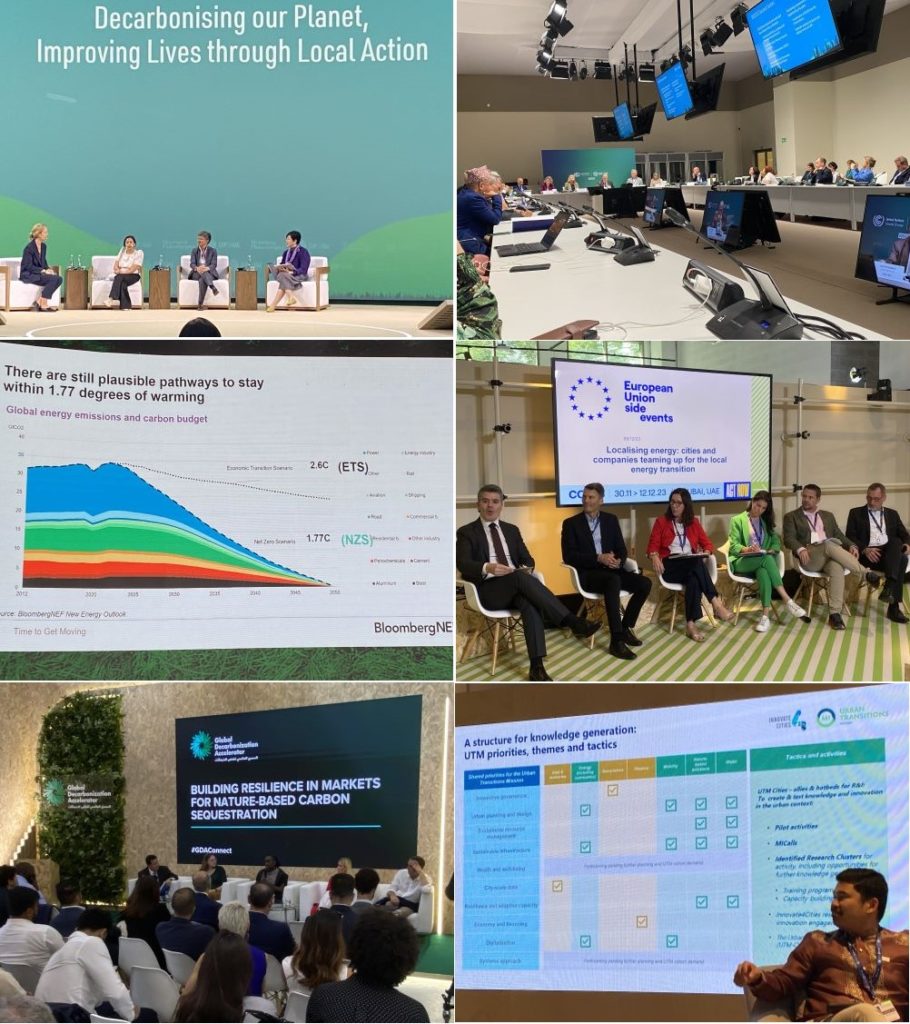
Aside from the LCAS, every day had overlapping conference events at different locations; it was simply impossible to attend them all. I spent some time at Bloomberg Green Forum, at the Canada Pavilion, at the Urbanization Pavilion and EU Pavilion, and other event sites. My criteria for choosing what to attend was partly geographic (see my first post about the expansive site), but I tried to attend events that spoke to local climate action (inspiration!), financing the transition (where’s the money?), innovation in electrical grid upgrades (very relevant to New West), and “Just Transition” discussions that spoke to what that means in the “developed world” context (this is one area where, interesting enough, the US is way ahead of Canada in many ways).
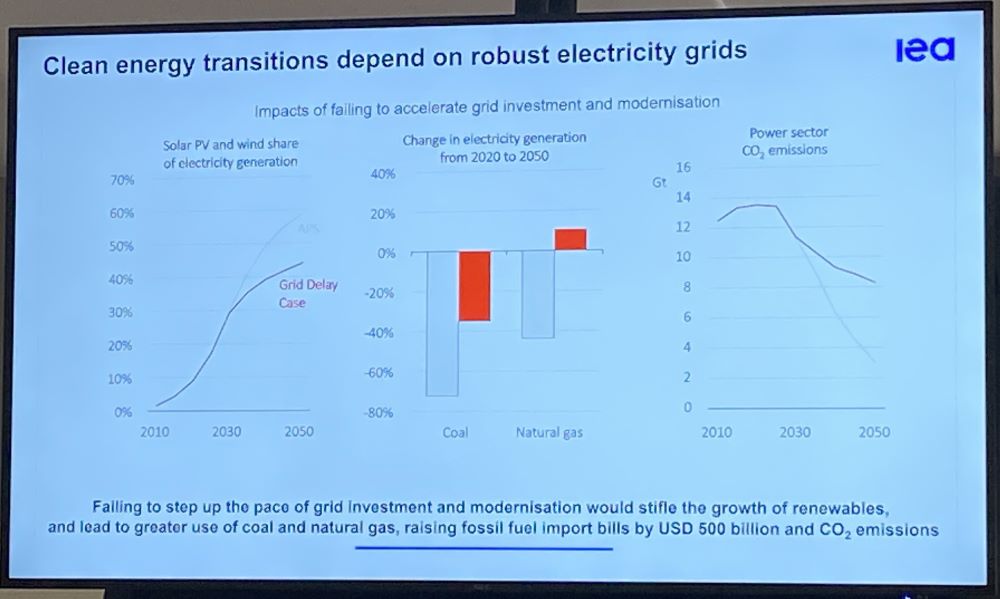
The global challenge to get a new energy grid built was an interesting theme. A place where some technical challenges need to be solved (and a better place for our innovation investment than CCS in my opinion). The core of the issue is that the world needs increasing amounts of electricity, and the cheapest ways to generate electricity, by far, are solar and wind. However, these sources rely on an integrated grid and grid storage technology that has technical, logistical, and even jurisdictional barriers to implementation. Coal and gas are dirty, and increasingly expensive, but they are easy, so the Global South and most rapidly-growing economies are still seeing them as a viable way to achieve their development goals. The grid is the problem, and there are lots of people looking to fix it, but will it be a public grid? (more on that later)

The Canada Pavilion had some interesting sessions. Don Iveson (former Mayor of Edmonton) led a panel on Canada’s National Adaptation Strategy (where I first heard the term “mutli-solving the polycrisis” as a description of local government climate response, and I will be repeating it) that included the Federal and Provincial Environment Ministers, along with local government represented by FCM and the Mayor of Regina. One interesting framing presented was that Climate Mitigation is primarily an energy problem, where Climate Adaption is primarily a water problem: drought and flooding are the two horsemen of this new apocalypse for Canadian cities. Rest assured, the message to the feds out of this conversation was (am I getting repetitive?) local governments are on the frontlines, and can do this work, if given the resources.
Another excellent presentation at the Canadian Pavillion was on the integration of land use with climate action, addressing how local government land use decisions impact our climate goals. Here I met Serena Mendizabal from Six Nations in Ontario (alas, 2023 Mann Cup Champions) who is doing interesting work bringing First Nations into the energy transition space, and developed a Just Transition Guidebook to help guide governments toward more meaningful Indigenous involvement in local climate action.
As I mentioned earlier, there were some sessions I attended with City Staff, and some where we went our different ways to cover more ground. The more technical aspect of staff’s work here really benefited from their ability to network with their cohort across North America, and even Europe and South America. They also had a chance to get facetime with FCM staff who hold the strings to the Green Municipal Fund, and staff in both the Provincial and Federal Ministries. That relationship building, and the ability to share our successes and our challenges – and demonstrate to them that we are a City committed to doing the work – will pay back in a huge way as staff move forward in implementing the Seven Bold Steps in New Westminster.
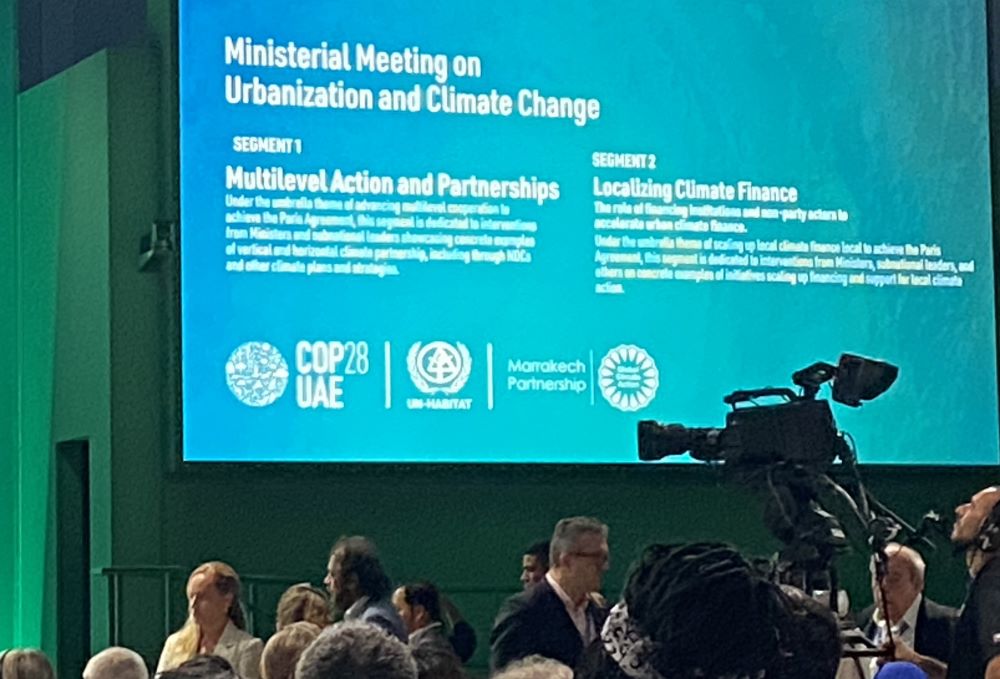
On our final day, I attended the Ministerial Meeting on Urbanization & Climate Change. This is where we stood (well, sat) shoulder-to-shoulder with the rest of the LMGA constituency to make our calls to the collected Ministers of Environment and negotiators from national governments around the world. In a weird coincidence, as I recently wrote about him in my Newsletter (subscribe here!), I sat next to Ravi Bhalla, the Mayor of Hoboken (the “New Westminster” of the New York Metro Region) during this session. I have already mentioned the Call to Action and Open Letter in the last post, so won’t repeat that here, but the dialogue with this group of Ministers was promising.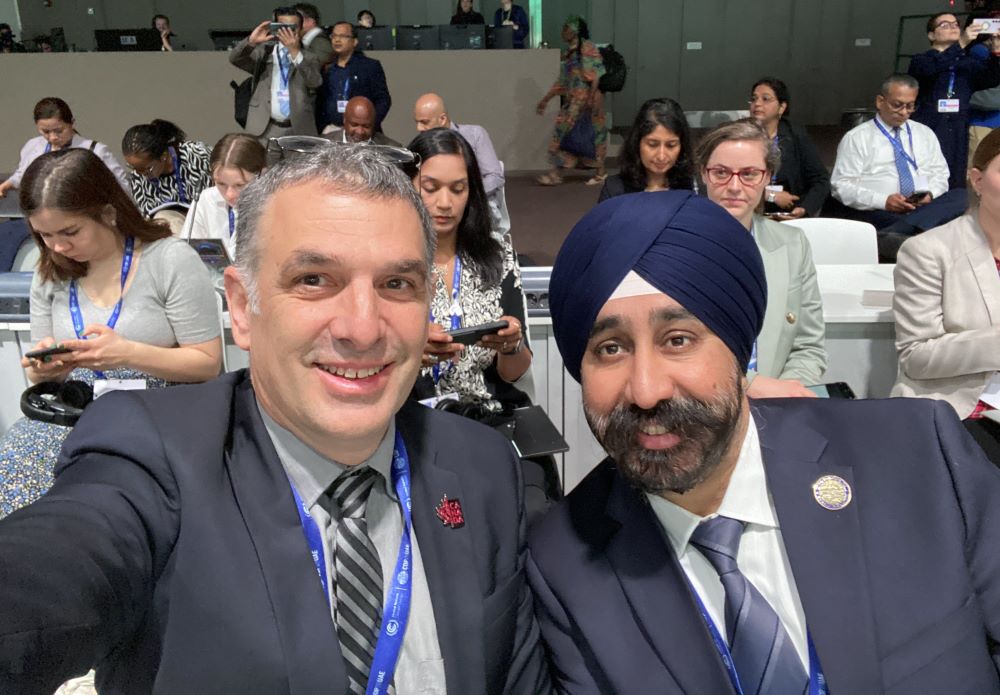
Also on our last day, we were able to attend the daily briefing of the Canadian negotiation team. This is where the representatives of the Canadian government (Minister Guilbeault and Canada’s Chief Negotiator Michael Bonser) update invited attendees on where the negotiations are, and then spend most of the hour taking questions from the audience. In the room were several stakeholder groups, including Elizabeth May (I didn’t notice any other federal party representatives, but I would be surprised if they were not there), representatives from Provincial Governments (again, I didn’t notice any BC Provincial elected types, though I assume staff from the Ministry of Climate Action and Environment were present), Labour groups, business constituencies, and activist groups. I’m not sure if it is a coincidence or a sign of something different happening in Quebec, but the activist questions to the Minister and negotiation teams were mostly delivered in French.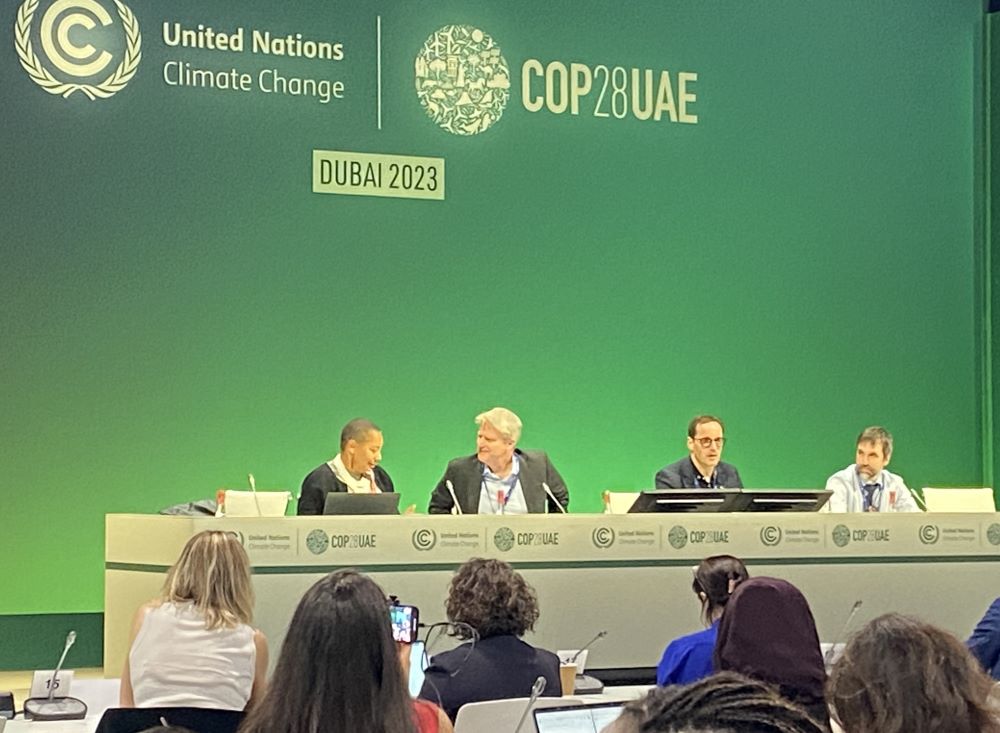
This was a really informative session for me, and gave insight into how the sausage of putting language to these international agreements is done. They spoke of early success (the Loss and Damage Fund secured on day 1), the failure to secure a food systems agreement, and the role the COP President had put on Canada to “find a landing zone” on Fossil Fuel phase-out (which even given hindsight, is not clearly a win given the weasel words included). Being Canadian, the most common answer to questions from the floor (which were almost all asking for more aggressive action and for Canada to lead in calling for it) was some form of “Yep, we hear you, that is consistent with our position, and we are working on it”.
The feelings brought home from 6 days at COP28 are complicated, but can be summed up in the Good, Bad, and Concerning.
Under “Good”, I am left with the positive feeling that local governments are On It. There were so many examples of local governments and inspiring local leaders doing to the work and building sustainable cities through a Just Transition lens. It was constantly repeated (and I’ll repeat here) that urban areas represent 80% of global GDP and 75% of global greenhouse gas emissions, and we are at the front line of climate action. At the same time there is pressure from the grassroots for local governments to meet and exceed Paris targets, because local governments from Langkawi to Bogota know that the actions needed to meet targets are the same actions that are going to make our cities cleaner, greener, more healthy, and more affordable to operate and protect.
On the “Bad” side, I don’t leave the conference convinced we were going to make it. I didn’t feel the national governments feel the same urgency that the scientific community is telling us we need. They all speak of concern, we heard many give addresses, from the Prime Minister of India to the President of Kenya and the King of Tonga, they all spoke of urgency, but then the language informing the negotiations gets much more nuanced. The timelines offered for fossil fuel phase-out (with even that bet hedged by talking “unabated emissions” and reliance on the CCS pipedream) or ending the construction of new coal power generation felt unambitious when the gavel fell on the 12th. The Global Stocktake told us clearly that the timeline for 1.5C is passing us by, and 1.77C might be the new ambitious target, and I’m not even convinced our collective national governments are there yet.
The “Concerning” part is a bit more about the nature of the conversations at so many of the panels and workshops, and this speaks a bit to the large presence of Global Capital in the room. There is a strong neo-liberal drive to get private capital involved at every level in the transition, especially in the Global South, where transition plans seem to bypass any public ownership of life-sustaining assets. I’m not a global finance guy, and cannot pretend to be, but a new language of colonization is apparent when we hear the entire conversation about reliance on private capital from Europe and America in the desire to build a modern energy grid to serve Africa, where wind and solar resources are ample, but the lack of a grid is a real development bottleneck.
The media and pundits loved to criticize the Oil Industry lobbyists being at COP28, but we all know what their game is. Everyone knows there is no viable path to a sustained climate unless we end the unabated emissions of fossil fuels, so let the producers hear that and be part of that conversation. It is the ubiquity of private capital from the Global North that is seeing a profit opportunity in energy transition in the South that is more concerning to me – as the language sounds just as extractive as past colonial discussions of the Global South. Maybe I’m too cynical, but when talk of Africa arose at COP28, at times it sounded like a new Berlin Conference. And with so much of the LGMA conversation about Just Transition and the need for climate solutions to also solve deep inequity problems, I cannot help but wonder how we will solve inequity through the privatization of – or the keeping private of – the next generation of public goods.
This stood in contrast to the LGMA call for local and indigenous-informed action, and maybe that is where I will close this too-long reporting out, quoting Call to Action 10:
Pursuant to their budgets, legislative and executive actions, and leadership mechanisms, subnational governments are publicly accountable institutions. Through the acknowledgement of their role in the Paris Agreement and Glasgow Climate Pact, they also play a key role in driving and engaging their communities into global action. From business to parliamentarians, from civil society to academics, from trade unions and farmers to indigenous communities, from faith groups to generational and gender equality advocates, we invite all stakeholders to consider their subnational governments as their ally in responding to climate emergencies.
